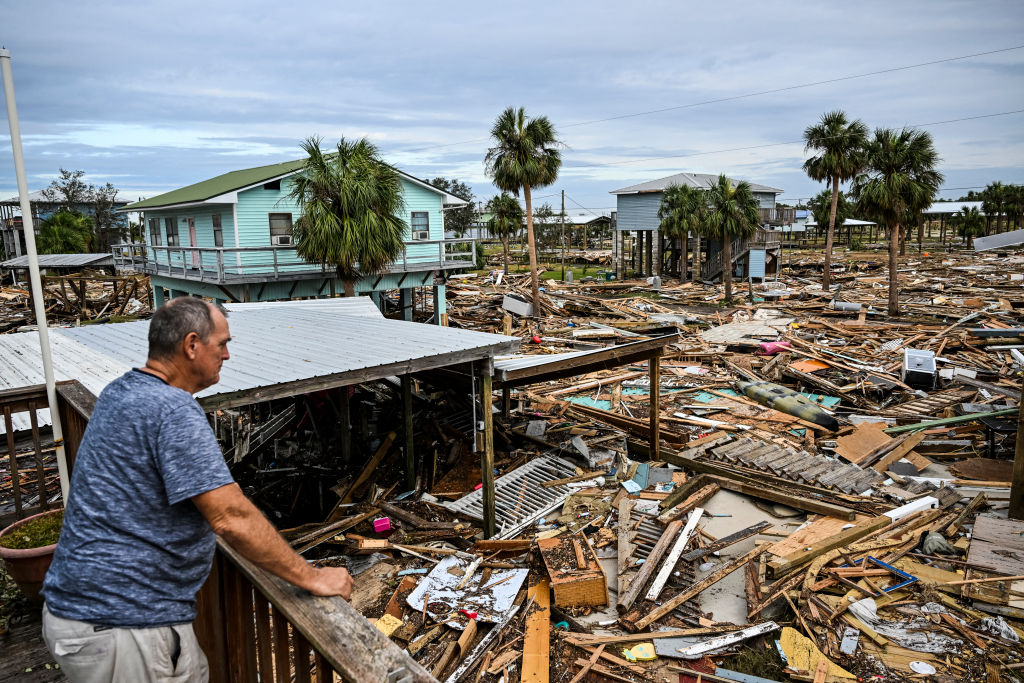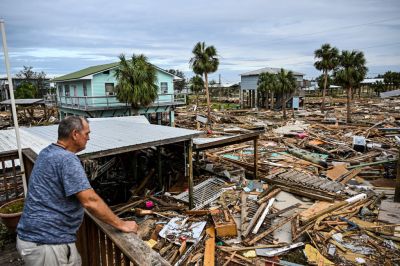Users on social media are making a number of claims about the $750 emergency relief payments offered to victims of Hurricane Helene through the Federal Emergency Management Agency (FEMA). Some are saying that the payments are all that hurricane victims can expect. Others are claiming that the payments are a loan that must be paid back. Both claims are false.
“Americans who have lost everything to Hurricane Helene will be getting $750, courtesy of FEMA.” Isabella DeLuca, a right-wing social media influencer tweeted, comparing the amount to certain U.S. expenditures overseas. Social media user John Basham shared DeLuca’s tweet on X, claiming that FEMA offered “Hurricane Helene Disaster Victims A ONE TIME PAYMENT Of $750.”
“I Meme Therefore I Am,” an X account with more than 500,000 followers, also pushed the claim. “Hurricane Helene victims received a one-time payment of $750,” the account tweeted, “while our tax dollars continue to fund Ukrainian pensions. Remember this when you vote in November.”
America First Legal, a right-wing public interest organization founded by Trump adviser Stephen Miller, tweeted, “Kamala [Harris] announces victims of Hurricane Helene will get only $750.” In the same post, the account shared a 19-second video clip of remarks Harris made while surveying hurricane damage in Georgia. “The federal relief and assistance that we have been providing has included FEMA providing $750 for folks who need immediate needs being met, such as food, baby formula, and the like, and you can apply now.”
Sean Davis, CEO and co-founder of The Federalist, heard the claim from a friend affected by Hurricane Helene and shared it with his almost 500,000 followers on X: “Text from a doctor friend whose family lives in a tiny mountain town in north of Asheville that’s been destroyed by flooding: 'People are getting insulin by donkey and FEMA’s response is $750 and wait for 3 weeks.' How is this happening in America?“
It’s not happening in America. The $750 payment FEMA is offering to victims of Hurricane Helene is just one of several emergency aid programs FEMA administers to disaster victims.
FEMA’s Serious Needs Assistance program provides eligible applicants with a one-time payment of $750 per household, designed to cover immediate emergency expenses. The $750 payment is not intended to cover the full extent of disaster expenses. Rather, it ensures some federal aid assistance is made quickly available to disaster victims while the federal agency can process applications for additional funding under other various FEMA programs.
Disaster victims may be eligible for the Serious Needs Assistance program if a household member is a legal resident in the U.S. and if the agency can confirm their identity and that they resided in a declared disaster region for most of the year, and that the disaster brought some form of damage to their home.
Responding to the false claim that FEMA offered only $750 to hurricane victims, the federal agency described the Serious Needs Assistance program on its website.
This is a type of assistance that you may be approved for soon after you apply, called Serious Needs Assistance. It is an upfront, flexible payment to help cover essential items like food, water, baby formula, breastfeeding supplies, medication and other emergency supplies. There are other forms of assistance that you may qualify for to receive and Serious Needs Assistance is an initial payment you may receive while FEMA assesses your eligibility for additional funds.
FEMA also shared the correction in a video-message on social media.
Other social media users have claimed hurricane victims will have to repay the $750. Hollywood actor James Woods, who boasts 4.2 million followers on X, posted an image of Harris laughing, captioned, “‘But the $750 is a LOAN!!!’”
“Hurricane victims are now realizing that the $750 from FEMA that Kamala Harris is offering them is actually a loan, not real relief,” Philip Anderson, a self-described “January 6th Survivor,” tweeted on Friday. “And that if they don’t pay it back the feds can seize their property.”
However, these are false—the $750 payment provided through FEMA’s Special Needs Assistance program is not a loan. Jaclyn Rothenberg, a director of public affairs and spokesperson for FEMA, debunked the false claim on social media. “This is not true,” she tweeted, responding directly to Anderson’s claim. “We do not ask for this money back.”
FEMA further clarified on its website that, “In most cases, FEMA grants do NOT have to be paid back.” While some FEMA payments are issued as loans, this is not true for most FEMA aid programs.
There are some less common situations in which you may have to pay FEMA back if you receive duplicate benefits from insurance or a grant from another source. For example, if you have insurance that covers your temporary housing costs, but you ask FEMA to advance you some money to help you pay for those costs while your insurance is delayed, you will need to pay that money back to FEMA after you receive your insurance settlement.
FEMA added that certain disaster-affected homeowners and small-business owners can apply for “low-interest loans. ” However, these are separate from other FEMA assistance programs.
Disaster victims can apply for FEMA’s Individual Assistance program that provides financial payments to eligible individuals and households, particularly for those “who have uninsured or under-insured necessary expenses and serious needs,” per FEMA’s website. While this program includes “flexible funding”—such as the Special Needs Assistance program—many applicants receive additional payments and assistance after their Individual Assistance application is more thoroughly reviewed.
According to FEMA,
Your assistance will be determined by comparing your recorded essential losses and serious needs to the types of assistance available within FEMA programs and services. FEMA assistance is not the same as insurance nor can it make the survivor whole. Federal assistance from FEMA only provides funds for the basic repairs to make a home safe, sanitary and livable.
In addition, FEMA may also provide financial assistance toward temporary housing—such as hotels or rental units—if the victim’s home was rendered unlivable by the disaster, while also providing further payments for disability-related repairs, to replace damaged equipment from self-employed victims, to replace computers, among others.
If you have a claim you would like to see us fact check, please send us an email at factcheck@thedispatch.com. If you would like to suggest a correction to this piece or any other Dispatch article, please email corrections@thedispatch.com.







Please note that we at The Dispatch hold ourselves, our work, and our commenters to a higher standard than other places on the internet. We welcome comments that foster genuine debate or discussion—including comments critical of us or our work—but responses that include ad hominem attacks on fellow Dispatch members or are intended to stoke fear and anger may be moderated.
With your membership, you only have the ability to comment on The Morning Dispatch articles. Consider upgrading to join the conversation everywhere.